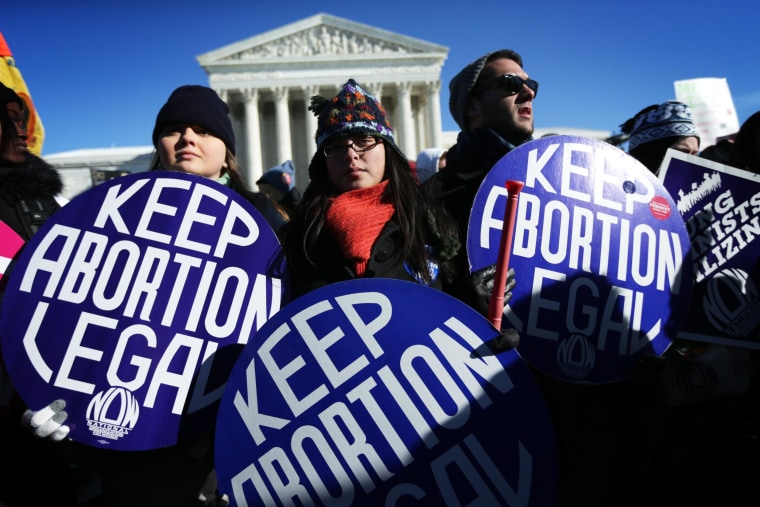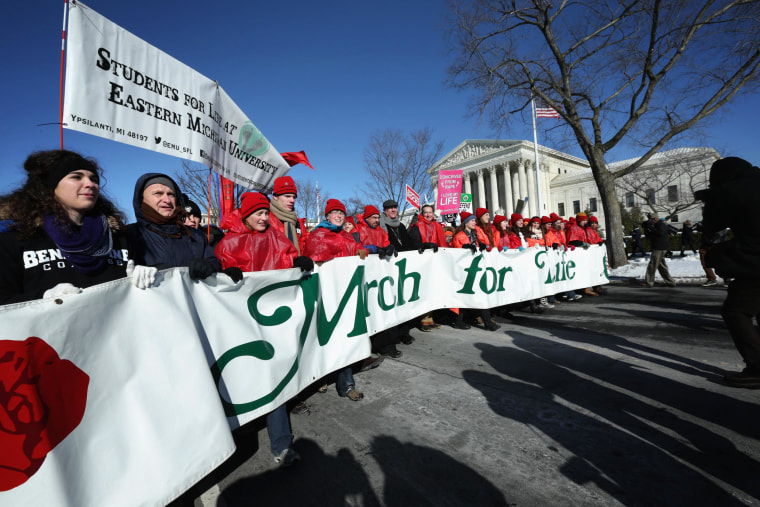Demonstrators took the steps of the Supreme Court Wednesday to mark the anniversary of the 1973 Roe v. Wade ruling, a decision that continues to be a powerful motivator for voters 41 years later.
House Majority Leader Eric Cantor, R-Va., told anti-abortion activists who gathered in the frigid cold, “Some of you have been marching for over 40 years and have endured many setbacks, including the recent expansion of abortion coverage in Obamacare.”
Abortion opponents argue that under the Affordable Care Act, insurance plans will pay for abortion-inducing drugs, a question the Supreme Court will address when next month. Cantor also told the crowd a House vote is scheduled next week on a bill to make bans on taxpayer funding of abortion permanent.
He pledged, “… the people’s House will stand for life.”
But it’s not just a debate playing out in Washington.
Battle lines in Virginia
In last November’s Virginia gubernatorial race, in exit poll interviews three-fifths of voters said abortion should be legal. Of that group more than two out of three voted for Democratic candidate Terry McAuliffe. One out of five Virginia voters identified abortion as the most important issue in the election and nearly three in five of them back McAuliffe.
The 2013 Virginia script might be put to the test again this fall as Republican challenger Ed Gillespie seeks to oust Sen. Mark Warner, the Democrat elected in 2008. Warner has a 100 percent rating from the abortion rights group, NARAL Pro-Choice America.

“Ed Gillespie would be a pro-life senator,” said his campaign spokesman Paul Logan in an e-mail Tuesday. “He looks forward to discussing with Virginians his views on the issue of life and other issues in the coming months of his campaign, and is bringing together policy advisors and eventually staff to help him develop a positive agenda consistent with his principles.”
Logan did not specifically respond to questions about whether Gillespie thinks Roe v. Wade was wrongly decided, or whether he’d seek significant abortion policy changes if he wins in November.
North Carolina, Arkansas under the spotlight
Abortion could also play a role in states such as North Carolina and Arkansas in this fall’s Senate races. In North Carolina, first-term Democrat Sen. Kay Hagan has a 100 percent rating from the abortion rights group NARAL Pro-Choice America, while in Arkansas two-term Democrat Sen. Mark Pryor has a 45 out of 100 rating.
Pryor broke from pro-abortion rights forces by voting for an amendment that allowed employers the right to not pay for certain health care services “because of conscience objections or religious beliefs.”
Such votes create scorecards which are useful for some voters, but there’s a legislative standoff at the federal level since a Republican-controlled House is pitted against a Democratic-led Senate. And the two parties are largely unified – Democrats generally supporting Roe and abortion rights, and Republicans mostly opposed to Roe and seeking to limit abortions.
Last June the House passed a bill that would outlaw abortions performed at 20 weeks after fertilization or later, except where the mother’s life were in danger or in cases of rape or incest. Six Democrats voted with all but six Republicans for the bill which went nowhere in the Senate.
Role of the Supreme Court
It was fitting that Wednesday’s March for Life rally was taking place within sight of the Supreme Court building because the court continues to be the final arbiter of abortion policy.
Last week, for example, the justices heard arguments in a challenge to a Massachusetts law that makes it a crime for people to stand on a public sidewalk within 35 feet of an entrance, exit, or driveway to an abortion clinic. Anti-abortion “sidewalk counselors” said they had a First Amendment right to have quiet conversations with women trying to persuade them to not go through with their planned abortions.
As the Massachusetts law indicates, much of the struggle is being played out in the state legislatures. According to the Guttmacher Institute, a group which supports abortion rights, last year 22 states enacted 70 abortion restrictions. “This makes 2013 second only to 2011 in the number of new abortion restrictions enacted in a single year,” the group said in a report.
Liberal-leaning states and conservative states are moving further apart on abortion. The Guttmacher report noted that last year California enacted a law expanding abortion availability by allowing physician assistants, certified nurse midwives and nurse practitioners to perform first-trimester abortions.
